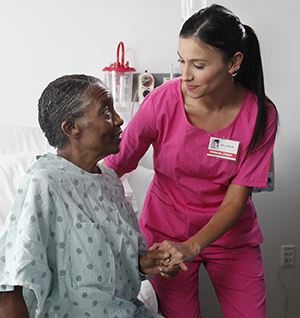After Hip Replacement: Recovering in the Hospital
You'll be moved to your room when you're awake. You can expect to feel some pain. To gain the best pain relief, answer honestly when you're asked how much you hurt. Once you've been shown how to protect your hip, you'll learn the skills needed to return to normal life. You’ll be taught how to walk, sit, and dress. To make moving easier, ask for pain medicines before each training session.
In your hospital room
You’ll be watched closely on the day of surgery. Any or all of the equipment below may be provided for your safety and comfort.
-
A foam wedge, a brace, or pillows may be used to keep your new hip in place during early healing.
-
A bar (trapeze) may be hanging over the bed. Use it to help lift your body when you change positions.
-
Special stockings and compression devices may be used to reduce the risk for blood clots. You may also be given medicine to help prevent clots.
Managing pain
At first you may feel pain, even with medicine. This is normal. But if your pain isn't reduced at all, be sure to tell the nurse.
Walking again
You may begin to stand and walk within hours after surgery. A physical therapist or other healthcare provider will help you. You'll be taught how much weight, if any, to put on your new joint. With practice, you’ll soon be able to move with just the aid of a walker. You can then use a cane or crutches as needed.
 |
| A physical therapist will help you walk after surgery. |
Online Medical Reviewer:
Rahul Banerjee MD
Online Medical Reviewer:
Raymond Turley Jr PA-C
Online Medical Reviewer:
Stacey Wojcik MBA BSN RN
Date Last Reviewed:
9/1/2023
© 2000-2025 The StayWell Company, LLC. All rights reserved. This information is not intended as a substitute for professional medical care. Always follow your healthcare professional's instructions.